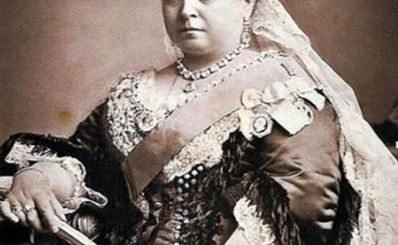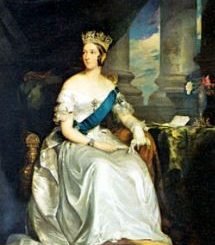Queen Victoria’s grandsons who ruled Britain, Germany, and Russia
Queen Victoria, known as the “Grandmother of Europe,” had an enormous impact on the political landscape of Europe through her descendants. Three of her grandsons went on to become significant rulers: George V of Britain, Wilhelm II of Germany, and Nicholas II of Russia. Their reigns and the connections between these rulers illustrate the complexities of European royal politics and the interlocking relationships that shaped the continent’s history leading up to World War I.

Queen Victoria was known as the “Grandmother of Europe” due to her numerous descendants who became monarchs or consorts across the continent, significantly influencing the royal and political landscapes of Europe. Image: Queen Victoria (1819 – 1901).
George V of Britain
George V, born in 1865, was the second eldest son of Edward VII and Queen Alexandra, who was the eldest son of Queen Victoria.
His accession to the British throne was somewhat circumstantial. Initially, George was not expected to become king, as his elder brother, Prince Albert Victor, Duke of Clarence and Avondale, was the direct heir.
However, Albert Victor died in the influenza pandemic in 1892, six weeks after his engagement, which thrust George into the position of heir apparent.
George ascended to the throne in 1910 following the death of his father, Edward VII. His reign saw the tumult of World War I, the rise of socialism and Irish nationalism, and the first steps towards the modern Commonwealth with the Statute of Westminster in 1931.
George V’s role during this period was primarily as a stabilizing figure, a symbol of continuity and tradition in a time of immense social and political upheaval. His leadership style was characterized by a strong sense of duty and morality, shaped by the Victorian values instilled in him by his grandmother.

Image: George V (1865 – 1936)
Wilhelm II of Germany
Wilhelm II, the eldest grandchild of Queen Victoria, was born in 1859 to her eldest daughter, Victoria, Princess Royal, and Prince Frederick III of Germany.
Wilhelm became the German Emperor and King of Prussia in 1888 after the deaths of his father and grandfather, which occurred within months of each other.
His reign was marked by a rapid departure from the more cautious diplomacy of his predecessors, pursuing a vigorous and often reckless foreign policy that aimed to assert German dominance on the European and world stage.
Wilhelm’s leadership contributed significantly to the tensions that led to World War I. His approach to international relations, known as Weltpolitik, was ambitious and nationalistic, aiming to expand German power and influence through a strong navy and global empire. This policy led to conflicts with neighboring nations and was a critical factor in the estrangement between Germany and Britain, despite his familial connections.

Image: Wilhelm II (1859 – 1941)
How did the assassination of Archduke Franz Ferdinand of Austria spark World War I?
Nicholas II of Russia
Nicholas II, born in 1868, was the son of Alexander III of Russia and Maria Feodorovna, who was a Danish princess and also a daughter of Queen Victoria’s son-in-law, Christian IX of Denmark.
Although not a grandson of Victoria by blood, Nicholas’s marriage to Alix of Hesse, who was a granddaughter of Queen Victoria, further intertwined the European royal families. Nicholas ascended to the Russian throne in 1894, following his father’s death.
His reign was troubled by political instability, including the 1905 Russian Revolution and the catastrophic performance of Russia in World War I.
Nicholas’s leadership faced significant challenges, including his reliance on the infamous Rasputin and his inability to address the fundamental social and economic problems plaguing Russia.
His failure to steer his country through the war and respond to internal pressures culminated in the 1917 Russian Revolution, which led to his abdication and eventually the execution of him and his family by the Bolsheviks.

The downfall of Wilhelm and Nicholas marked the end of an era for royal absolutism in Europe, while George V’s adaptation to constitutional monarchy set a precedent for the survival and evolution of the British Crown. Image: Nicholas II of Russia (1868 – 1918).
Conclusion
The reigns of these three monarchs, influenced by their grandmother Queen Victoria, were pivotal in the history of Europe. Their rule represented the height of monarchical power across Europe, but also the significant challenges that monarchies faced during the early 20th century. The interconnectedness of their reigns through familial ties and the resultant alliances and enmities exemplify the complex web of relations that defined European politics at the time.

FAQs
Why was Queen Victoria known as the “Grandmother of Europe”?
Here are some frequently asked questions about Queen Victoria’s descendants:
How many children did Queen Victoria have?
Queen Victoria and her consort, Prince Albert, had nine children: Victoria, Edward, Alice, Alfred, Helena, Louise, Arthur, Leopold, and Beatrice. These children married into various royal families across Europe, earning Queen Victoria the nickname “the grandmother of Europe.”
Who were some of Queen Victoria’s most famous grandchildren?
Queen Victoria’s grandchildren included notable monarchs such as George V of the United Kingdom, Wilhelm II of Germany, and Nicholas II of Russia. Each played significant roles in the early 20th century, particularly during World War I.

Away from the discord between her descendants during WWI, the familial ties created by Queen Victoria across monarchies contributed to a culturally interconnected Europe and left a lasting legacy on the continent’s royal and noble families. Image: An 1833 portrait of Victoria.
How did Queen Victoria’s descendants influence European politics?
Queen Victoria’s descendants sat on the thrones of several European countries, including England, Russia, Germany, Norway, Sweden, and Spain. This widespread presence in European monarchies led to intricate familial relationships that significantly influenced diplomatic relations and, in some cases, the courses of national policies and conflicts, most notably World War I.
Are there any current monarchs descended from Queen Victoria?
Several current reigning monarchs are direct descendants of Queen Victoria. These include King Charles III of the United Kingdom, King Harald V of Norway, King Carl XVI Gustaf of Sweden, King Frederik X of Denmark, and King Felipe VI of Spain. Their lineage illustrates the enduring legacy of Queen Victoria in contemporary European monarchies.
What impact did Queen Victoria’s children have on other royal families?
Queen Victoria’s children married into other royal families, creating alliances that shaped European political landscapes. For example, her daughter Victoria married the German Emperor Frederick III, linking British and German royalty. These marriages often served to cement political alliances, though they could also complicate diplomatic relationships, as familial ties did not always prevent conflicts.

Did Queen Victoria have any influence on her grandchildren’s upbringing?
Queen Victoria took a keen interest in the upbringing and marriages of her grandchildren, often advising or even insisting on certain matches. She believed in the importance of strong moral values and was known to be a strict and imposing figure within her family, although the direct influence on their upbringing varied depending on the physical and political distance of her children’s courts.
How did World War I affect Queen Victoria’s descendants?
World War I had profound impacts on Queen Victoria’s descendants, with many of them ruling in countries that were on opposing sides of the conflict. The war led to significant strains in the familial relationships between the monarchs of Germany, Russia, and Britain, contributing to the collapse of the German and Russian monarchies and forever altering the role of the monarchy in governance.
Were Queen Victoria’s descendants involved in any scandals?
Several of Queen Victoria’s descendants were involved in scandals that had both personal and political ramifications. Perhaps most famously, her grandson Wilhelm II’s aggressive policies and erratic behavior contributed to the tensions that led to World War I, while her cousin and grandson through marriage, Nicholas II of Russia, was seen as ineffectively responding to the crises that led to the Russian Revolution.
What was the genetic disease many of Queen Victoria’s descendants inherited?
Many of Queen Victoria’s descendants inherited hemophilia, a genetic disorder that impairs the body’s ability to make blood clots, a process needed to stop bleeding. This was sometimes referred to as the “Royal disease” and was passed through several royal families in Europe.
Their stories reflect the complexities of dynastic marriages, the interplay of personal relationships and political power, and the dramatic shifts in the role of monarchy in modern governance.



























